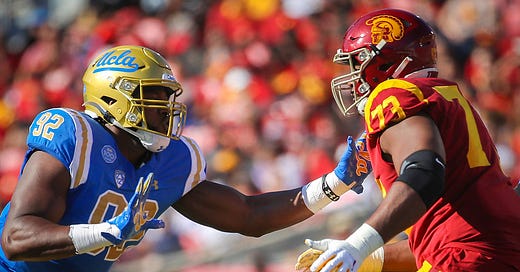SERIES: The Future of Football
Part 2: Why is college football on Saturdays and the NFL on Sundays? The answer may surprise you, so might the future
This post is Part 2 in a SERIES on the future of football. You can read part 1 here on the rise and decline of football, as it looked on the eve of the pandemic.
The much-loved pattern of American football on fall weekends has college games on Saturdays and the NFL playing on Sundays. It has been this way for so long — since well before I was born — that it might seem like a tradition or even a natural law as fixed as the seasons, with fall following summer.
It’s not. The cadence of American football weekends is actually the result of federal legislation passed more than 60 years ago to protect the economics of college football from competition from the NFL.
Congress got into the business of regulating football on TV even before that. In 1953, U.S. courts determined that it was legal for the NFL to "blackout" games from outside a region in the area where a game was being played. The courts and the league worried that fans whose local teams were relatively weaker would stay home to watch on TV other, more competitive match-ups between strong teams.
This dynamic, investors in the NFL thought, would ultimately lead to the failure of smaller, weaker teams who could not attract substantial in-person crowds and thus revenue, ultimately threatening the viability of the entire league. At the time gate receipts were the largest source of revenue for NFL teams, and the new technology of television threatened that model. So gate revenues had to be protected In an era of multi-billion-dollar TV contracts, that idea is quaint.
Several years after, the NFL and its upstart competitor, the American Football League, decided to bundle their games together across a season, and then sell the bundle as a package to the TV networks. However, the US courts soon ruled that anti-trust laws meant that the leagues could not package their football games together for sale to the TV networks, arguing that it violated the rights of individual clubs.
As a result of this court decision against selling rights to a package of games across a season and across leagues, according to a law review article by Brett Goodman, "the NFL, immediately ran to Congress, which lent a sympathetic ear." One result of the leagues' lobbying of Congress was the Sports Broadcasting Act of 1961 which granted Congressional protection to the football leagues to negotiate TV rights collectively, a form of anti-trust exemption.
Importantly however, the anti-trust exemption was not extended to all days of the week. The Act carved out Saturdays for televising college games to prevent college football from having to compete with the NFL.
Specifically, the anti-trust exemption granted to the NFL and AFL did "not apply to any professional football game televised (1) between the hours of 6 pm Friday and 12 am Sunday, (2) beginning on the second Friday in September and ending on the second Saturday in December." That is why Saturday NFL games don’t show up until mid-December every year.
A while back, the Tulane Sports Law Blog explained the technical details of how the SBA carved up weekends for college and NFL football:
While section 1291 of the SBA exempts the NFL and other professional leagues from antitrust attack when pooling their broadcast rights, section 1293 takes away that protection in certain circumstances. Section 1293 was designed to protect college football gate receipts from the potentially devastating effects of competing for crowds against televised professional football games.
The SBA prevents NFL broadcasts from competing with college football attendance by removing the antitrust exemption granted in section 1291 when the NFL broadcasts games at times when college games are typically played. If the NFL and its broadcast partners were to televise any of the games sold in the pooled packages during the prohibited time frame, they would risk treble damages in the event those pooled packages are held to be in violation of antitrust laws.
The cadence of fall football was set, not based on tradition, but by federal government regulation.
With college football undergoing rapid and profound shifts, it is fair to question whether the SBA of 1961 is past its sell-by date. Soon players will be paid (beyond what they already are today via NIL and other compensation) and the college football playoff will expand. Is it possible that the Saturday and Sunday division between college and pro football also gives way?
Imagine sitting down on a random fall Saturday or Sunday in coming years to watch a double-header: Alabama vs Georgia, followed by the Baltimore Ravens vs. Pittsburgh Steelers. Buckle up. Change may be coming.





"Is it possible that the Saturday and Sunday division between college and pro football also gives way?" I hope the division holds. As a fan, I like to veg out on college ball on Sat, and ignore the NFL on Sunday while doing something useful. NFL games on Sat would crowd out college games; college games on Sunday would mean I'd be spending too much time in front of the TV – and the leaves would pile up on what's left of my lawn!
"Specifically, the anti-trust exemption granted to the NFL and AFL did "not apply to any professional football game televised (1) between the hours of 6 pm Friday and 12 am Sunday, ... ."
High school football is commonly on Friday afternoon and evening, so this protected those games as well. The rule effectively prevented pro football all day on Friday, since daytime games would not make much sense with many people at work.